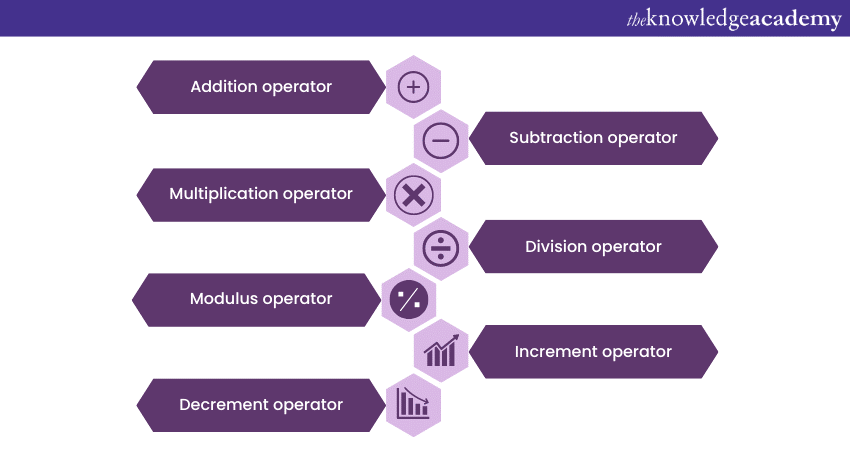We may not have the course you’re looking for. If you enquire or give us a call on +44 1344 203 999 and speak to our training experts, we may still be able to help with your training requirements.
We ensure quality, budget-alignment, and timely delivery by our expert instructors.

Grasping arithmetic expressions in Java is essential for anyone aiming to dive into this versatile language. From basic operations to operator precedence, these concepts form the bedrock of countless applications.
Arithmetic Expressions in Java are composed of the usual operators with equal priority and are performed from left to right. Continue reading below to learn more.
Table of Contents
1) An introduction to Arithmetic Expression in Java
2) Exploring the various Arithmetic Operators in Java
a) Addition operator
b) Subtraction operator
c) Multiplication operator
d) Division operator
e) Modulus operator
f) Increment operator
g) Decrement operator
3) Conclusion
An introduction to Arithmetic Expression in Java
Arithmetic Expressions play an essential role in structuring complex functionalities in Java. They basically represent mathematical operations that are constructed using operands and operators. Operands are the values on which the operation is being performed, such as on the numbers in a mathematical equation.
Additionally, the Java Operators are the symbols that specify the type of arithmetic operation to be performed, such as addition (+), subtraction (-), multiplication (*) or division (/). A fundamental understanding of how to form and implement these Arithmetic Expressions is the key to mastering Java.
The understanding of Java operators is vital due to the simple fact that almost every process in Java involves some form of arithmetic operation. Whether it's calculating the dimensions of a new window in a GUI application or running algorithms in data analysis, Arithmetic Expressions are everywhere.

Exploring the various arithmetic operators in Java
Arithmetic operators facilitate elementary mathematical operations. Understanding these operators is critical in Java, as they lay the groundwork for constructing complex arithmetic expressions and building robust applications. Here is a list of the arithmetic operators in Java, described in detail as follows:

Addition operator
The addition operator can be written in Java using the '+' symbol. It is used to sum up two or more numbers.
For example:
The expression 'int result = 10 + 20;', the '+' operator adds 10 and 20, storing the result (30) in the variable 'result'. It's an essential operator used widely in different computations in Java.
Subtraction operator
The subtraction operator in Java symbolised as '-', is utilised to subtract one number from another in Java.
For example:
int result = 50 - 20;
The '-' operator subtracts 20 from 50, yielding 30, which is then stored in 'result'.
Multiplication operator
The multiplication operator in Java is denoted by ''. It's used to multiply two numbers.
For example:
'int result = 5 * 10;',
The '' operator multiplies 5 by 10, yielding a result of 50, which is stored in the variable 'result'.
Division operator
Represented by '/', the division operator in Java is used to divide one number by another. However, Java performs integer division, meaning it discards any fractional part.
For example:
'int result = 20 / 4;'
The '/' operator divides 20 by 4, yielding 5.
Modulus operator
The modulus operator (%) in Java returns the remainder value from a division operation.
For example:
'int result = 11 % 5;'
The '%' operator will yield 1 because when 11 is divided by the integer 5, the remainder is 1.
Increment operator
The increment operator (++) is a unique operator in Java that increases the value of a variable by 1.
For example:
'int a = 5; a++;' would increase the value of 'a' to 6. It's often used in loops and other control structures.
Decrement operator
The decrement operator (--), another special operator in Java, decreases the value of a variable by 1.
For example:
'int a = 5; a--;' would decrease the value of 'a' to 4.
Like the increment operator, the decrement operator is frequently used in loops and control structures.
Learn about the various data types, operators and methods for creating your web applications by signing up for the Java Programming Course now!
Conclusion
A fundamental understanding of Arithmetic Expressions in Java is vital for anyone seeking to dive into this dynamic language. From basic operations to operator precedence, these concepts form the bedrock of countless applications.
Learn to program your own websites and applications by signing up for the Java Training Course now!
Frequently Asked Questions
Upcoming Programming & DevOps Resources Batches & Dates
Date
 Java Programming
Java Programming
Mon 20th Jan 2025
Mon 3rd Mar 2025
Mon 12th May 2025
Mon 14th Jul 2025
Mon 22nd Sep 2025
Mon 17th Nov 2025







 Top Rated Course
Top Rated Course


 If you wish to make any changes to your course, please
If you wish to make any changes to your course, please


